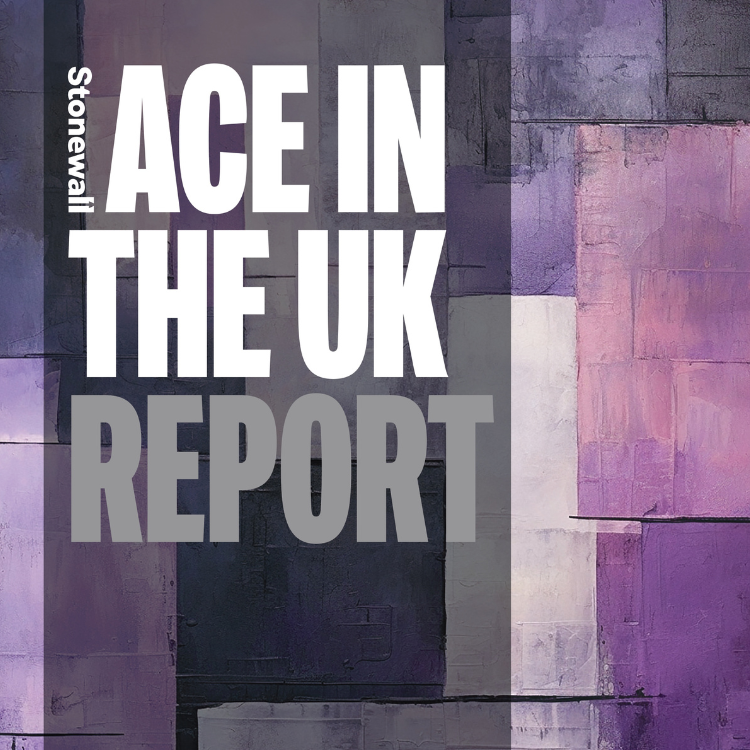
Stonewall x Yasmin Benoit Ace Project
Photo: Apollo Flux, @apollo_flux
Stonewall is proud to partner with ace activist Yasmin Benoit on a first-of-its-kind partnership project to better understand the experiences of ace people in the UK.
Research conducted as part of this initiative will build a picture of ace communities’ experiences, needs, and priorities for change, with a focus on employment, healthcare, and education.
In 2023, we launched the Ace in the UK Report, an analysis of our findings which provide a clear set of actions for policymakers, companies, and charities to better support ace people.
We’ve answered some frequently asked questions about the project below.
- What is asexuality?
Asexuality is a spectrum. Here are a few terms to know:
Somebody who is asexual, or ‘ace’, does not experience sexual attraction to anyone.
A grey-asexual (grey ace/grey-a) person may experience sexual attraction very rarely or only under specific circumstances. Demisexual people only experience sexual attraction after developing a strong emotional bond with someone.
There’s also an aromantic spectrum. Somebody who is aromantic does not experience romantic attraction and a grey-romantic person only does very rarely. Demiromantic people are only romantically attracted to those they’ve emotionally bonded with first. Not all ace people are aromantic, but aromantic people are highly represented in the ace community.
You can find the answers to other questions you may have about asexuality here.
- Why is this project necessary?
Awareness of ace identities has increased over the last few years. However, there’s still a worrying lack of understanding of the needs and experiences of ace people, who are often subject to dehumanising myths and misconceptions.
Asexuality isn't currently regarded as a sexual orientation under UK law, but rather listed as a hypoactive sexual desire disorder. It’s also not covered by the UK Equality Act 2010.
On top of this, research shows that ace people face prejudice and discrimination throughout the UK.
In the Government’s National LGBT Survey, asexual respondents had one of the lowest life satisfaction scores (5.9 out of 10), nearly 9 in 10 (89%) had avoided being open about their sexual orientation, and 10% of asexual respondents had been offered or undergone conversion therapy. These statistics show that today in the UK, many ace people still experience significant barriers to living their lives freely.
While many are aware of some of the challenges that asexual people face, there’s a concerning absence of research on their experiences – often due to a historic lack engagement with ace communities.
Estimates showing that between 0.44-1 per cent (295,768 to 672,200) of the UK population is asexual. Despite this, the needs of this significant community have long been ignored, even among the LGBTQ+ community.
Ace communities have always played an integral role in the fight for LGBTQIA+ rights but their needs and experiences have too-often been ignored.
We know that ace people face dehumanisation and prejudice from across society, including in our own community.
This ground-breaking project will directly engage with the concerns and experiences of ace people, and create a plan of action based on their needs.
Our community has always been stronger when we fight for each other and today’s announcement is a step forwarding in helping more ace people feel safe and free.
Yasmin Benoit

Yasmin Benoit is a British model, asexual activist, writer, and speaker. Described as "the unlikely face of asexuality" by Cosmopolitan Magazine, she started the #ThisIsWhatAsexualLooksLike movement for diverse asexual visibility and representation and co-founded International Asexuality Day (April 6).
“I'm incredibly proud to be partnering with Stonewall on such a monumental project and using my experience, platform and research background to drive ace rights forward. Having worked as an asexual activist for the past four years, it has been continuously brought to my attention that there are ace people in UK who don't feel protected by the current Equality Act. There is a void in research when it comes to asexuality and acephobia and this will help to fill it.”
- Yasmin Benoit



